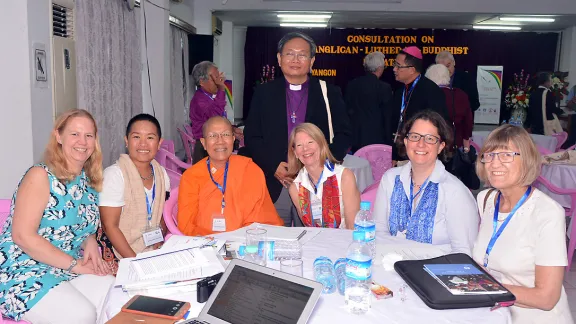
Members of the consultation, in Myanmar. The consultation aimed to tell positive stories of how the two faith traditions engage with each other in Myanmar. Photo: Anglican church
Lutherans and Anglicans seek better relations with Buddhists in Myanmar
(LWI) – Seventy participants from Buddhist and Christian communities meeting in Myanmar have called for enhanced collaboration between the two faiths locally and globally.
“Voices of hope in a new era” was the theme of the 16-20 January gathering, held in Yangon, with participants from Japan, Myanmar, Sri Lanka, Taiwan, Thailand, the United Kingdom, United States, and staff from The Lutheran Federation (LWF) Communion Office and World Council of Churches (WCC).
The aim of the consultation was to listen to the positive stories of how the two faith traditions engage with each other in Myanmar; learn about Buddhist scholars’ perspectives for better relationships with Christians; and explore how joint action, living together, prayer and meditation could be mutually beneficial.
In a joint statement, participants called on their respective constituencies to help forge closer relationships anchored on the shared values of humility, honesty and humanity. They encouraged Buddhist and Christian academic and religious institutions to find ways of working together, and called for equal participation of women and men in the different activities, they stated.
We Christians have quite excluded ourselves from the main religion [Buddhism] in the country. This kind of consultation will give us a heart to understand them more, it helps to break barriers.
Breaking barriers
Rev. Si Khaw from the LWF member, Mara Evangelical Church, expressed appreciation for the consultation in a country where the different religious groups seek better understanding of each other.
“We Christians have quite excluded ourselves from the main religion [Buddhism] in the country. This kind of consultation will give us a heart to understand them more, it helps to break barriers,” he said.
Archbishop Stephen Than Myint Oo of host church, the Anglican Church of the Province of Myanmar, in his opening sermon shared how both Buddhists and Christians, struggled to survive following the 2008 cyclone Nargis.
“In the face of such disaster it becomes clear that whether you are Christian, Buddhist or Muslim, your common enemies are these deathly tides that threaten your life, and your common goal is to survive,” he said of the fierce storm that left nearly 85,000 people dead and more than 53,000 missing, according to the United Nations (UN).
He underlined the fact that sustainable peace processes in society require not only political expertise but also religious and spiritual dimensions.
Although Myanmar has no official state religion, Theravada Buddhism is the predominant faith, practiced mostly by people from the Burman ethnic group. The remaining groups practice Christianity, Hinduism, Islam, traditional animistic beliefs, and others. Conference participants expected that improved interreligious relations would open the way for greater participation of ethnic and religious minorities in society.
Promoting human rights
Ms Francesca Traglia, deputy program coordinator of LWF Myanmar, introduced recommendations from the 2016 UN Human Rights Council Universal Periodic Review. Myanmar’s agreement to accelerate political, socio-economic and administrative reforms, and promote and protect human rights included recommendations to strengthen interfaith and interethnic harmony, combat discrimination and violence against ethnic, religious and other minorities, and to counter hate speech and incitement to violence.
“It is important to jointly follow-up on these commitments and be in contact with government institutions at different levels in the process of implementation,” Traglia said.
Worship and meditation
Participants discussed Christian-Buddhist relations in other parts of the world, took part in Christian worship and Buddhist meditation, and jointly reflected on biblical texts.
Rev. Dr Arata Miyamoto, Japan Evangelical Lutheran Church, said Paul’s description of the deep transformation of the ego in Galatians 2:19-20 resonates with the liberation from the ego that Buddhist teaching describes. While it is clear that Paul “always pointed to the crucified Christ,” as they key to transformation, engaged Christian-Buddhist dialogue can jointly address contemporary self-centered life-styles and work towards transformation in society.
Interreligious dialogue
LWF study secretary for Public Theology and Interreligious Relations Rev. Dr Simone Sinn noted the consultation had shown that Christian and Buddhist teachings offer both a critical and constructive voice with regard to development in society. “This meeting was a step towards analyzing current challenges and opportunities together and joining hands in collaboration,” she said.
WCC program executive for Interreligious Dialogue and Cooperation, Rev. Dr Peniel R. Rajkumar, reiterated the vital role of interreligious dialogue in peace building and reconciliation. “While these are seldom easy tasks, the consultation drew hope from the vast resources of compassion that scriptures and spiritual traditions of both religions provide and acknowledged that the seeds of transformation lie in strengthening relations at multiple levels with patience and persistence.”
The Network for Interfaith Concerns in the Anglican Communion, the LWF and WCC jointly organized the consultation with the goal to develop strategies for future relationship between Anglicans, Lutherans and Buddhists around the world. While participants mostly discussed presentations about the experiences, beliefs and practices of Christians and Buddhists in Myanmar, they also visited and held discussions with staff and monks of the International Theravada Buddhist Missionary University in Yangon.


